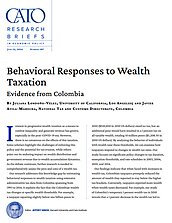Our research addresses this knowledge gap by estimating behavioral responses to wealth taxation using extensive administrative tax data from Colombia spanning from 1993 to 2016. It exploits the fact that the Colombian wealth tax changes at specific wealth thresholds. For example, a taxpayer reporting slightly below one billion pesos in 2010 ($520,830 in 2010 US dollars) owed no tax, but an additional peso would have resulted in a 1 percent tax on all taxable wealth, totaling 10 million pesos ($5,208.30 in 2010 US dollars). By analyzing the behavior of individuals with wealth near these thresholds, we can examine how taxpayers respond to changes in wealth tax rates. Our study focuses on significant policy changes to tax duration, exemption thresholds, and rate schedules in 2003, 2006, 2010, and 2014.
Our findings indicate that when faced with increases in wealth tax, Colombian taxpayers promptly reduced the amount of wealth they reported to stay below the higher tax brackets. Conversely, taxpayers reported more wealth when wealth taxes decreased. For example, our study of Colombia’s temporary 1 percent wealth tax in 2010 reveals that a 1 percent decrease in the wealth tax led to an immediate 2 percent increase in reported wealth for taxpayers near the threshold. Our research evaluates various wealth tax regimes and finds that up to one-fifth of revenue is lost due to taxpayers’ reducing their reported wealth.
Additionally, we discovered that the impact of wealth taxes persists even after these policies expire. Our findings suggest that taxpayers continued to report lower levels of wealth for years following the expiration of these tax policies. Taxpayers strategically adjusted their reported wealth to avoid detection and future taxation. Those who reduced their reported wealth in response to the tax consistently reported lower wealth, and those whose reported wealth initially fell below the threshold also avoided surpassing the expired threshold to preemptively avoid future taxes. This implies that a temporary wealth tax can have enduring effects on wealth distribution and government revenues.
Furthermore, our research indicates that taxpayers’ responses to wealth taxes are influenced by their tendency to misreport assets that authorities are unable to verify. In Colombia, a third party reports financial wealth, but nonfinancial assets are only partially accounted for, and the valuation of certain assets, such as stocks in closely held private businesses, poses challenges—a common issue faced by countries that implement wealth taxes. Our analysis demonstrates that taxpayers who were close to the wealth tax thresholds tended to possess more assets that were not reported by third parties, as these are easier to manipulate, and fewer fixed assets, such as real estate, which are not easily altered. Specifically, taxpayers underreported business assets that were not subject to third-party reporting while artificially inflating their liabilities. These behaviors align with evidence discovered in studies of taxpayer behavior in Europe.
Finally, our research shows that wealth taxation drives the wealthiest individuals to hide their assets in entities that are difficult to trace, particularly in tax havens. By combining Colombian tax records with the Panama Papers, a collection of leaked documents containing data on clients of Mossack Fonseca—one of the world’s top creators of hard-to-trace companies, trusts, and foundations—we gained valuable insight into Colombian wealth being moved offshore. Panama has been a preferred tax haven for Colombians, making the Panama Papers highly relevant for examining Colombian wealth offshoring. Our analysis reveals that since the reintroduction of the wealth tax in Colombia, more Colombians have established offshore entities on a yearly basis, surpassing taxpayers from other countries. Furthermore, as the wealth tax rates have increased, affluent individuals have increasingly shifted their assets to tax havens. These findings reveal that individuals who incorporated offshore entities in years when wealth was taxed subsequently reported fewer assets to Colombian authorities, suggesting a deliberate strategy of concealing assets in difficult-to-track entities to minimize the impact of the wealth tax.
NOTE
This research brief is based on Juliana Londoño-Vélez and Javier Avila-Mahecha, “Behavioral Responses to Wealth Taxation: Evidence from Colombia,” National Bureau of Economic Research Working Paper no. 32134, February 2024.

